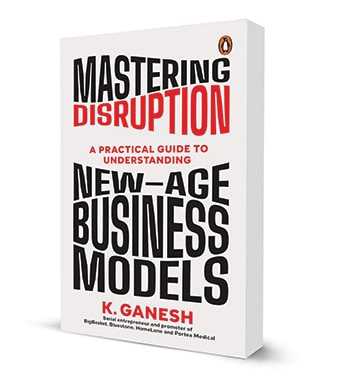Not fair to say Indian entrepreneurs are copycats: K Ganesh
Serial entrepreneur K Ganesh discusses his latest book, why the longevity of companies is reducing, and how markets have become more circumspect with new-age business IPOs


Disruption takes an outsider to change the status quo, says serial entrepreneur K Ganesh. In his latest book Mastering Disruption, Ganesh, the founder of venture building platform GrowStory, who has incubated and scaled successful startups like BigBasket, Portea Medical and Bluestone, talks about how new-age business models in India have localised, innovated and made money. In an interaction with Forbes India’s From the Bookshelves podcast, he discusses IPOs and value creation amid profitability concerns, how investors navigate the high-risk, high-reward potential of new-age companies, and how artificial intelligence (AI) is changing the business landscape in India. Edited excerpts:
Q. Your book says the average lifespan of a company has reduced from 90 years in 1930 to between 12 and 18 years today. While new-age business models are emerging, why is the longevity of companies reducing?
There are historically five waves of innovation: Waterpower, steam power, electricity, electronics and petrochemicals, and software and digital networks. The sixth wave is AI and robotics. The timeframe between each wave is becoming shorter. DeepSeek, OpenAI, ChatGPT, hot topics of today, are less than two-and-a-half-years-old. When I was in college, we never talked about things that were that old. We talked about steel, or automotive, all of which had a 30-40-year cycle. So, one reason [for reducing longevity of businesses] is failure to keep pace with rapidly changing technology. Second, the business models are changing. Take BYD or Tesla, for instance. For centuries, the car manufacturing industry focussed on people who could make great internal combustion engines (ICE). Suddenly, the rules of the game have changed. Today, the major car competitor is not the person with the engines, but the person with battery technology. The speed of disruption is baffling.
Q. Does it take someone from outside the traditional ecosystem to bring in disruption? Like how Elon Musk and Tesla challenged ICE cars.
Yes, disruption is outside in. Legacy businesses are stuck with what we call the sunk cost fallacy. In fact, one of my pet peeves is that we needed foreign investors like Tiger Global and others to see the potential in the Flipkarts and BigBaskets of India, while existing retail giants, be it Reliance or Birlas or Tatas, were not able to see this right in their backyard, in a country where they are employing thousands of people. They could have easily funded this and made all the money. This is true even abroad. Microsoft did not start Google. Google did not start Facebook, and Facebook did not start Twitter [now X]. So outside in is most likely for disruption, because of fresh thinking, not having sunk cost fallacy, and not getting bogged down by existing challenges.
Q. What is your personal approach to understanding disruption?
My belief is that we are not geniuses with special insights. We cannot out-execute existing folks. I can complain about the state of grocery stores, but can I run a better company than Spencer’s or Nilgiris? Clearly no. They are all smart and committed people. So, I believe that to succeed in an existing space, we need to come up with something that is a new way of doing things that changes the status quo.
Q. Many new-age companies challenging the status quo have business models mirroring the West. But they have also successfully innovated for local contexts…
There is nothing wrong in copying models. But it is not fair to say that Indian entrepreneurs are simply copying models. In the initial days of BigBasket, before we had our own warehouses, we purchased from Metro Cash & Carry and other stores like that. I’m talking about some 15 years ago, when nothing was automated, so their stock was not known. If they had a product in stock when you placed an order on the BigBasket app, by the time I went to the store to pick it up, either they had the wrong product, or it was sold out. We had to solve for all of these challenges separately. So, the Indian problems and contexts are different. On the positive side, the digital public infrastructure that India has developed is the envy of the world. From Aadhaar to UPI [Unified Payments Interface], it has opened up phenomenal opportunities for disruption for the next 10 years.
Q. IPOs of new-age businesses ran into choppy waters. How do investors balance the high risk associated with the high rewards?
Now that enough new-age business IPOs have happened, people have lost money, and all that have tempered the euphoria, and people are more circumspect, which is great for the system. Absence of any blow up would have been worse in terms of size and scale. Second, a lot of investor education needs to be done because for multiple decades, markets followed the traditional model, and suddenly, in the last two to three years, there were many new-age business models.
First Published: Mar 20, 2025, 15:51
Subscribe Now